An abbreviation like OPEC appears in the media every now and then. The goals of this organization are to regulate the black gold market. The structure is a rather important player on the world stage. But is it really so rosy? Some experts are of the opinion that it is OPEC members who control the situation in the black gold market. However, others believe that the organization is just a cover and a "doll", manipulating which more powerful powers only strengthen their power.
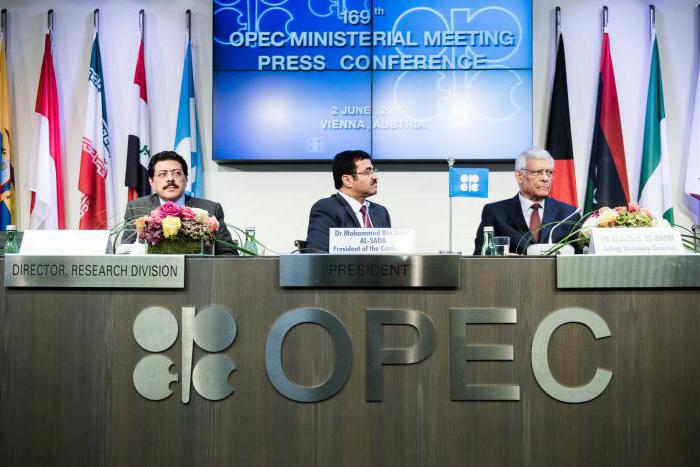
Well-known facts
It is the Organization of Petroleum Exporting Countries that has the OPEC designation. A more accurate interpretation of the name of this structure in English sounds like the Organization of Petroleum Exporting Countries. The essence of the structure’s activity is that it allows states where black gold mining is the main economic sector to influence the oil products market. That is, one of the main tasks of the organization is to establish the cost per barrel, which is beneficial to large market players.
Members of the association
Currently, thirteen states are members of OPEC. Only one thing unites them - the presence of deposits of combustible liquid. The main participants in the organization are Iran, Iraq, Qatar, Venezuela and Saudi Arabia. The latter has the greatest authority and influence in the community. Among the Latin American powers, in addition to Venezuela, Ecuador is a representative of this structure. The hottest mainland included the following countries included in OPEC:
- Algeria;
- Nigeria;
- Angola
- Libya.
Over time, a couple more Middle Eastern states, such as Kuwait and the United Arab Emirates, became members. However, despite this geography, OPEC countries have set up headquarters in Vienna, the capital of Austria. Today, it is these oil exporters that control forty percent of the total market.
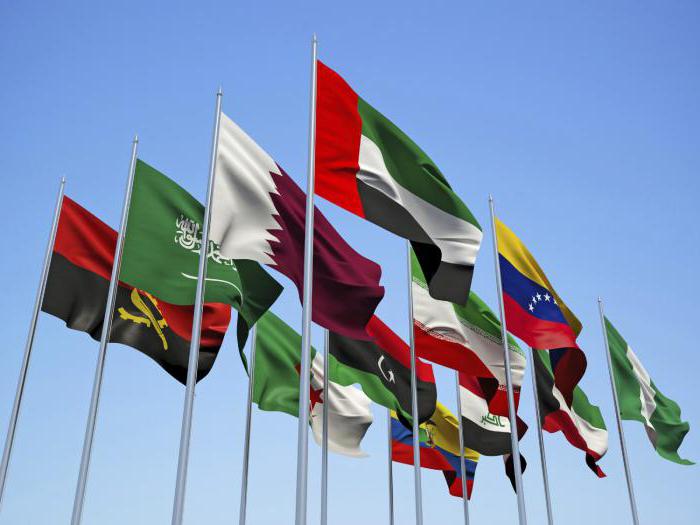
Historical background
The history of OPEC begins with a meeting of world leaders in the export of black gold. These were five states. The place of their meeting was the capital of one of the powers - Baghdad. What inspired the countries to unite is explained very simply. One of the factors influencing this process is the phenomenon of decolonization. Just at the time when the process was actively developing, and the countries decided to get together. It happened in September 1960.
The meeting discussed ways to get out of control of global corporations. At that time, many lands that were dependent on the metropolis began to be liberated. They could now set the direction to the political regime and economy on their own. Freedom of decision is what the future OPEC members wanted to achieve. The goals of the nascent organization included stabilization of the cost of a combustible substance and the organization of its zone of influence in this market.
At that time, companies from the West held the most authoritative positions in the black gold market. This is Exxon, Chevron, Mobil. It was these largest corporations that proposed making the price per barrel an order of magnitude lower. They explained this by the totality of costs affecting oil rents. But since in those years the world did not particularly feel the need for oil, demand was lower than supply. The powers, from the unification of which the organization of oil-exporting countries would soon emerge, simply could not allow the implementation of this proposal.
Sphere of influence
The first step was to settle all the formalities and organize the work of the structure according to the model. The first headquarters of OPEC was in the capital of Switzerland - Geneva. But five years after the establishment of the organization, the Secretariat was moved to Vienna, Austria. Over the next three years, provisions reflecting the rights of OPEC members were developed and formed. All these principles were integrated into the Declaration, which was adopted at the meeting. The main essence of the document is a detailed explanation of the capabilities of states in terms of control of national natural resources. The organization has gained wide publicity. This attracted the entry into the structure of new members, which were Qatar, Libya, Indonesia and the United Arab Emirates. Later, another major oil exporter, Algeria, became interested in the organization.
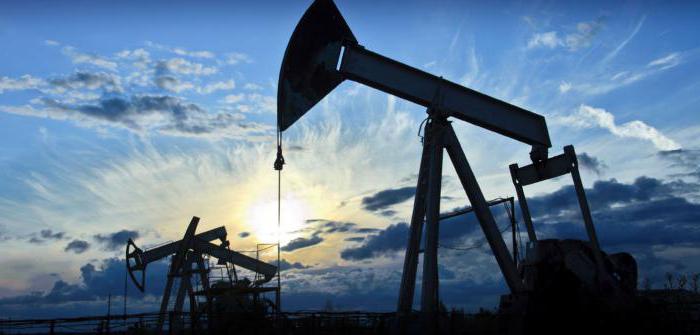
OPEC headquarters transferred the right to control production to the governments of the countries included in the structure. This was the right move and led to the fact that in the seventies of the last century the influence on the world market of OPEC black gold was very large. This is confirmed by the fact that the price per barrel of this combustible substance directly depended on the decision of this organization.
In the seventy-sixth year, OPEC's work outgrew new tasks. The goals have received a new direction - this is a focus on international development. The latter decision led to the emergence of the OPEC Fund. The organization’s policy has acquired a slightly updated look. This led to the fact that several other states became interested in joining OPEC - African Nigeria, Gabon and Latin American Ecuador.
The destabilization of the organization made eighties. This is due to falling prices for black gold, despite the fact that before that it reached maximum levels. This has led to the fact that the share in the world market of OPEC member countries has decreased. According to analysts, this process has led to a deterioration in the economic situation in these states, since this sector is kept on the sale of this fuel.
The nineties
In the early nineties, the situation became reversed. The cost of a barrel has increased, and the organization’s share in the global segment has also expanded. But this also had its own reasons. These include:
- introduction of a new component of economic policy - quotas;
- A new pricing methodology is the OPEC basket.
 However, even such an improvement did not satisfy the members of the organization. According to their forecasts, the rise in prices for black gold should have been an order of magnitude higher. An obstacle to the expected was the unstable economic situation in the countries of Southeast Asia. The crisis lasted from ninety-eighth to ninety-ninth year.
However, even such an improvement did not satisfy the members of the organization. According to their forecasts, the rise in prices for black gold should have been an order of magnitude higher. An obstacle to the expected was the unstable economic situation in the countries of Southeast Asia. The crisis lasted from ninety-eighth to ninety-ninth year.
But at the same time, a significant advantage for oil exporting countries was the development of the industrial sector. A huge number of new industries have appeared in the world, the working resources of which were precisely this combustible substance. Intensive globalization processes and energy-intensive businesses have also created the conditions for an increase in the price of a barrel of oil.
The structure of the organization also outlined some changes. In place of Gabon and the suspension of its work as part of the structure of Ecuador, the Russian Federation came. The observer status for this largest exporter of black gold has become a significant plus for the credibility of the organization.
New millennium
Constant economic fluctuations and crisis processes marked a new millennium for OPEC. Oil in price then fell to a minimum level, then soared to sky-high figures. At first, the situation was quite stable, there was a smooth positive dynamics. In 2008, the organization renewed its membership, Angola accepted membership in it. But in the same year, crisis factors sharply worsened the situation. This was manifested in the fact that the price per barrel of oil fell to the level of the two thousandth year.
Over the next two years, the price of black gold leveled off a bit. It has become as comfortable as possible for both exporters and buyers. In 2014, the newly activated crisis processes lowered the cost of a combustible substance to a value that was zero. But, despite everything, OPEC is steadily experiencing all the difficulties of the global economy and continues to influence the energy resource market.
Basic goals
Why is OPEC created? The goals of the organization are to preserve and increase the current share in the global market. In addition, the structure affects pricing. In general, these tasks of OPEC were established during the creation of the organization and there were no significant changes in the direction of activity. The same tasks can be called the mission of this association.
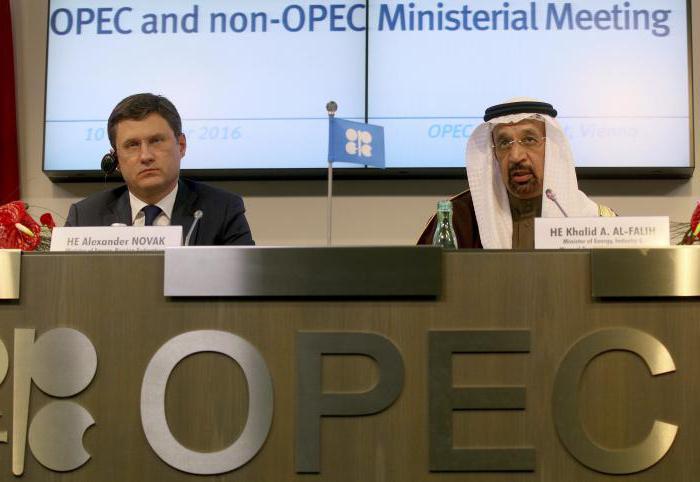
OPEC's current goals are to:
- improving technical conditions to facilitate the extraction and transportation of black gold;
- expedient and effective investment of dividends received from the sale of oil.
The role of organizations in the global community
The structure is registered with the United Nations under the status of an intergovernmental organization. It was the UN that formed some of the functions of OPEC. The association has its word in resolving some issues related to the global economy, trade and society.
An annual meeting is held at which representatives from the governments of oil-exporting countries discuss the future direction and strategy of activities in the world market.
Now the states included in the organization are engaged in the production of sixty percent of the total oil. According to analysts, this is not the maximum level that they can reach. Only Venezuela fully develops its storage facilities and sells its reserves. However, the union still cannot reach consensus on this. Some believe that it is necessary to get the maximum possible in order to prevent an increase in the influence of the United States on the world energy market. According to others, an increase in production only leads to an increase in supply. In this case, a decrease in demand will entail a reduction in the price of a given combustible substance.
Organization Structure
The main person of the organization is OPEC Secretary General Mohammed Barkindo. It is this person who is responsible for everything that the Conference of the States Parties decides. At the same time, the Conference, convened twice a year, is a leading management body. During their meetings, members of the association address the following issues:
- consideration of the new membership - the provision of membership to any country is discussed together;
- personnel shifts;
- financial issues - budget development.
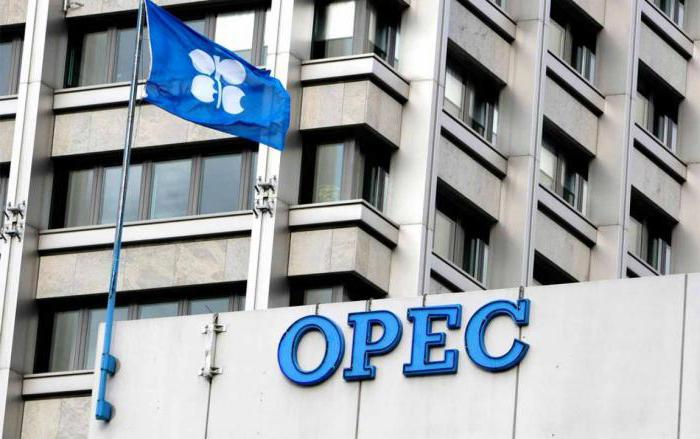 The development of the above problems is handled by a specialized body called the Board of Governors. In addition to it, departments occupy their place in the structure of the organization, each of which studies a certain range of topics.
The development of the above problems is handled by a specialized body called the Board of Governors. In addition to it, departments occupy their place in the structure of the organization, each of which studies a certain range of topics.
An important concept in organizing the work of OPEC is also a “basket of prices”. It is this definition that plays a key role in pricing policy. The meaning of the “basket” is very simple - this is the average value between the cost of combustible substances of various grades. The brand of oil is set, depending on the producing country and grade. Fuel is divided into “light” and “heavy”.
Also leverage on the market are quotas. What are they like? These are the restrictions on the extraction of black gold per day. For example, if quotas are reduced, a deficit arises. Demand begins to exceed supply. Accordingly, due to this, the price of a combustible substance can be increased.
Prospects for further development
The number of countries in OPEC does not mean that this composition is final. The abbreviation fully explains the goals and objectives of the organization.Many other countries that are waiting for membership approval also want to follow the same policy.
Modern analysts believe that in the near future, not only oil exporting countries will dictate the conditions on the energy market. Most likely, the direction in the future will be set by importers of black gold.
How comfortable the import conditions will be will also determine the development of national economies. That is, if the industrial sector is developed in the states, this will cause stabilization of prices for black gold. But in the event that production requires excessive fuel consumption, there will be a gradual transition to alternative energy sources. Some enterprises may simply be liquidated. This will cause a reduction in prices per barrel of oil. So, we can conclude that the most reasonable solution is to find a compromise between protecting their own national interests and oil exporting countries.
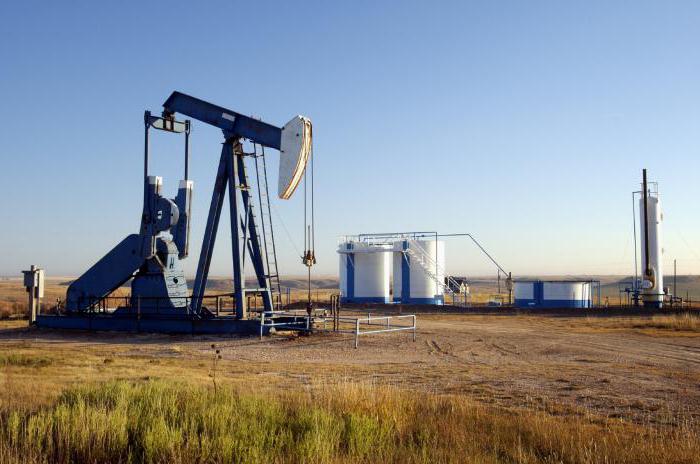
Other experts are considering such a situation that there will be no substitute product for this combustible substance. This will significantly strengthen the influence of exporting countries on the world stage. So, even despite the crisis and inflationary processes, the decline in prices will not be particularly significant. While some deposits are developed rather slowly, demand will always exceed supply. It will also help these powers enjoy great authority in the political sphere.
Problem points
The main problem of the organization is the difference in the position of the participating countries. For example, Saudi Arabia (OPEC) has a low population density and at the same time huge deposits of "black gold". Also a feature of the country's economy is investment from other countries. Saudi Arabia has partnerships with Western companies. In contrast, there are countries that have a fairly large number of inhabitants, but at the same time a low level of economic development. And since any project related to energy requires large investments, the state is constantly in debt.
Another problem is that the profits made from the sale of black gold must be properly distributed. In the first years after the formation of OPEC, members of the organization spent finances left and right, boasting of their wealth. Now this is considered bad form, so money has been spent more competently.
Another issue that some countries are struggling with and which is one of the main tasks at the moment, is technical backwardness. Remains of the feudal system are still present in individual states. Industrialization should have a great impact not only on the development of the energy industry, but also on the quality of life of people. Many enterprises in this area lack skilled workers.
But the main feature of all OPEC member countries, as well as the problem, is their dependence on the extraction of black gold.